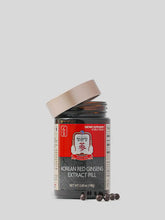FREE SHIPPING ON ORDERS OVER $99!
Trending Now
Popular Products
Frasco de extracto de legado
465 reviews
Extracto de ginseng rojo coreano JungKwanJang es una forma concentrada de raíz de ginseng que ayuda a combatir el estrés, mejora el sistema inmunológico, apoya la función cognitiva, aumenta la circulación sanguínea y aumenta la energía. Con más de un siglo de experiencia,...
- De $55.99
$55.99- De $55.99
- Precio unitario
- / por
Everytime Original Extract Stick
405 reviews
Presentando a JungKwanJang Extracto de ginseng rojo coreano Everytime 3000 mg barras, elaboradas para entusiastas de la salud que buscan extracto de ginseng rojo coreano de alta calidad. Nuestro extracto, obtenido cuidadosamente de raíces de ginseng seleccionadas, está concentrado para brindar la potente eficacia...
- De $129.99
$129.99- De $129.99
- Precio unitario
- / por
Tarro de Extracto CheonNok
84 reviews
Ginseng rojo coreano Rejuvenece tu cuerpo con el extracto muy especial de terciopelo de asta de ciervo y ginseng rojo. El extracto premium de Cheon Nok está elaborado con extracto certificado de terciopelo de asta de ciervo y extracto de ginseng rojo coreano, ¡los...
- De $47.99
- De $47.99
- Precio unitario
- / por
Bolsa de Hong Sam Won
446 reviews
JungKwanJang Hong Sam Won es una bebida de ginseng rojo coreano mezclada con canela, jengibre y extracto de fruta de azufaifa. Esta bebida sin cafeína está diseñada para revitalizar y despertar tu cuerpo y mente. ¡Un tónico delicioso que mantiene tu energía durante todo...
- De $23.99
$23.99- De $23.99
- Precio unitario
- / por
Píldora de extracto de legado
153 reviews
Ginseng rojo coreano Pruebe las píldoras de extracto de ginseng para aumentar su energía. No contiene otros estimulantes ni cafeína. El ginseng es uno de los suplementos a base de hierbas más populares del mundo y ahora está disponible en este práctico suplemento de...
- $73.99
$73.99- $73.99
- Precio unitario
- / por
Extracto Stick de 2000mg Everytime
195 reviews
Acelere su flujo de energía Presentamos las barritas JungKwanJang Korean Red Ginseng Everytime de 2000 mg, la elección perfecta para los recién llegados al mundo del ginseng. Especialmente formulado para reducir el amargor y brindar un sabor más suave, este conveniente producto le permite...
- De $35.99
$35.99- De $35.99
- Precio unitario
- / por
0
0 elementos
Investigar
- Al elegir una selección, se actualiza la página completa.






